1902 Search Results for video of the week
November 25, 2015
by Carole Zangari -
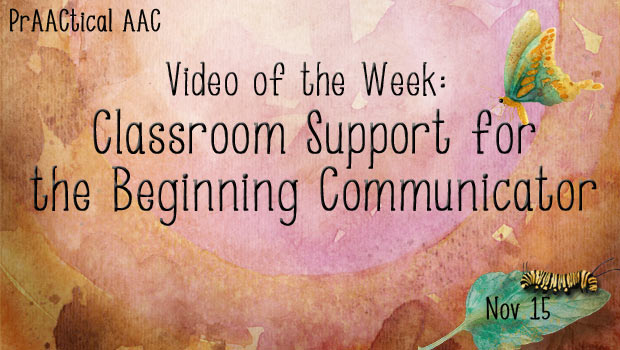
Gabriella doesn’t seem to notice what her teachers and peers are doing in the classroom. When offered a choice of toys, she seems to reach for one rather randomly, has little interest in the one she chose, and knocks it to the floor after 30 seconds. Elliot is assertive in greeting visitors to his classroom, and eagerly leads them around the room, vocalizing excitedly as he shows them around. When he needs help with a toy or material, he hands it to an adult with clear intent and expectation. He’s not using actual words just yet, and his interest in PECS has been limited. Alyssa uses a communication board to make requests and answer questions, but only with a lot of prompting. She uses single symbol utterances in planned communication opportunities during a few activities during the school day. Team members have observed spontaneous use of her AAC tools a... [Read More...]
November 18, 2015
by Carole Zangari -
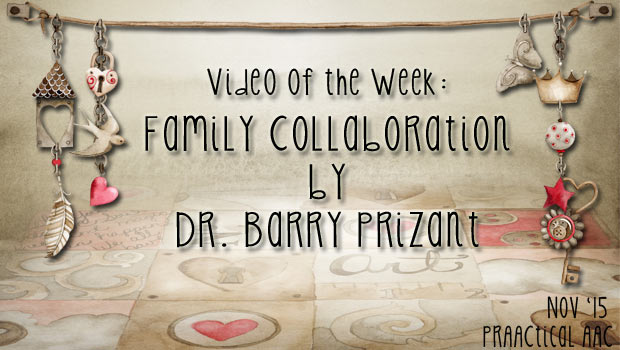
Several of you have reached out to express appreciation for the videos by Dr. Barry Prizant that were shared in recent months. In this one, he discusses effective strategies for building strong collaborative relationships with families. Thanks to Presence Learning for making this available.
November 4, 2015
by Carole Zangari -
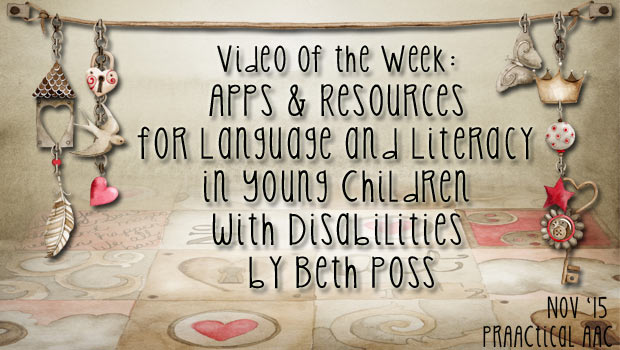
Our video for this week features Beth Poss, an SLP and AT consultant, with a wealth of experience. In this video, Beth reviews the many ways in which mobile technology can be used to to support the development of early language and literacy with young children who have disabilities. Many thanks to the Center for Technology and Disability for making this available.
October 28, 2015
by Carole Zangari -

For several years, we’ve written many posts on the use of visual supports with AAC learners. One thing we haven’t talked about, though, is what to do when you’re in the midst of therapy or a lesson, and the need for an additional visual support arises. In this week’s featured video, SLP Shannon Hennig does an amazing job of explaining how she improvises to make visual supports on the fly. Like you, I appreciate the plethora of visual supports that have been appearing on Teachers Pay Teachers, SLP blogs, materials exchange sites, and Pinterest. Most of them are just adorable, some of them are well-designed, and all of them make using visual supports more convenient for busy professionals and families. In the end, though, the best visual supports are the ones that meet the needs of the situations. And, while we do our best to predict what will be needed... [Read More...]
October 21, 2015
by Carole Zangari -
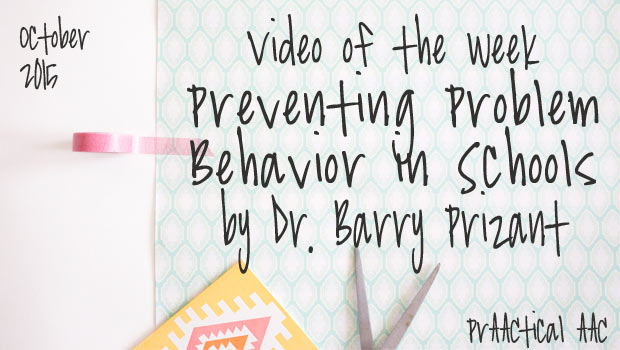
Today, we return to the Presence Learning site for more videos by Dr. Barry Prizant. In this 2-part sequence, he discusses strategies for preventing problem behaviors in schools. You can view the Q & A section (Part 2) here.
October 14, 2015
by Carole Zangari -
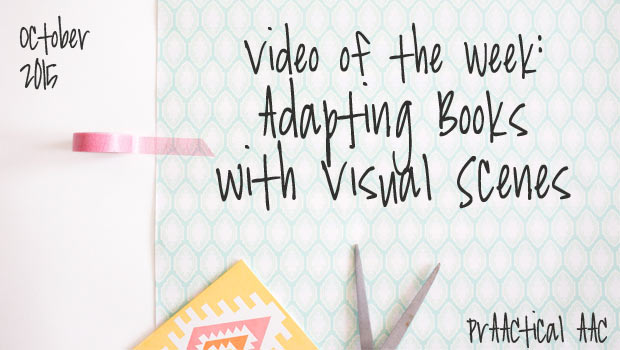
There is so much we have yet to learn about the best ways to get beginning communicators engaged in language learning. In this brief video, Dr. Nimisha Muttiah talks about a strategy for combining selected features of adapted books and visual scene displays to create an easy-to-use, no-tech communication aid. You can read more about the strategy here. Thanks to Hillary Jellison, Nerissa Hall, and the rest of the team at Communicare for making this available. You can check out more from the Communicare team in these guest posts.
October 7, 2015
by Carole Zangari -
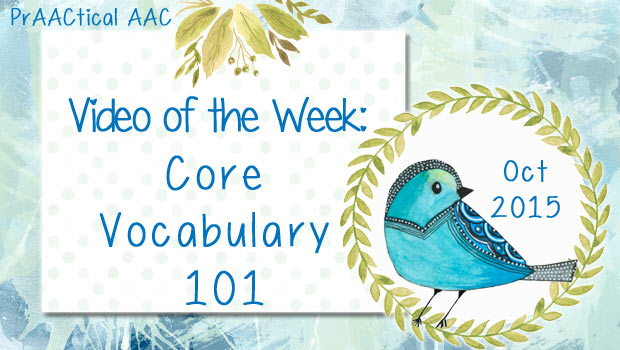
Last month, we featured some wonderful videos from a project of the Angelman Syndrome Foundation that is a great starting point for anyone preparing to implement robust AAC for the first time (you can see that here). Today, we return to the ASF Communication Training Series to get an overview of key constructs in core vocabulary. SLP Maureen Nevers helps us understand the role of core vocabulary in AAC systems and instructional plans (such as IEPs). Even if you are familiar with core vocabulary, this video addresses issues that will support implementation. Many, many thanks to the ASF and the Foster Family Charitable Foundation for the support the provided to create this video and for making it available to all of us.
September 30, 2015
by Carole Zangari -
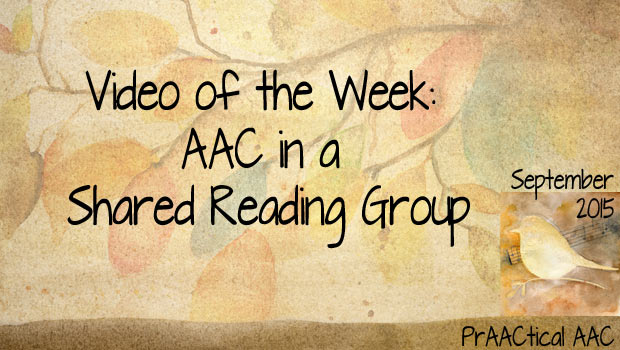
Ever wonder what a group reading experience looks like when the participants are older students who learning to use AAC? Check out this clip from the fabulous team at Willans Hill.
September 23, 2015
by Carole Zangari -
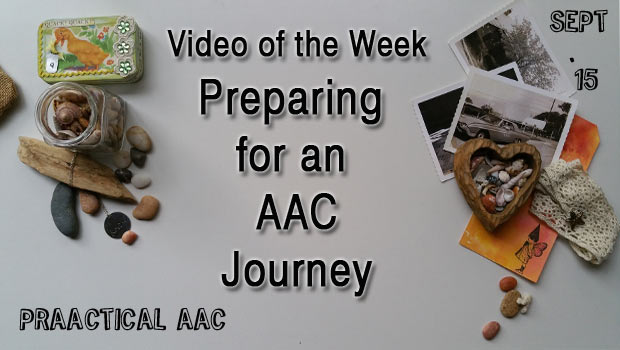
Looking to support a family who is new to AAC? Working with a teacher or SLP who is ready to boost their implementation of AAC across the day? Do we have a resource for you! The Angelman Syndrome Foundation has put together a truly amazing set of videos and support materials to help us get started in AAC implementation. While developed in support of children and adults with Angelman Syndrome, the information has much broader applicability and is appropriate for a wide range of developmental disabilities. The first one, From Goals to Growth: The Essential Elements Of An AAC System, is presented by SLP Maureen Nevers, an AAC Consultant from Burlington, Vermont. It covers the components of an AAC system and learn specific practices to increase the quality of an AAC system. You can get the handout for this presentation here. In the second video of the series, Maureen addresses the... [Read More...]
September 16, 2015
by Carole Zangari -
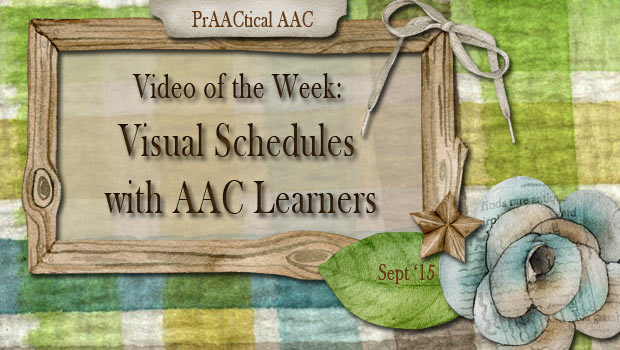
While our therapy sessions are highly individualized to meet the needs of specific individuals, there are a couple of strategies that are effective with almost every learner on our caseloads. Topping that list is the use of visual schedules. Whether it is a written agenda, a picture schedule for the session, a mini schedule for the parts of an activity, or an object schedule for the day’s events, this is one of the few strategies that has something to offer every learner. We’ve written before about this topic. In this post, you can find links to many of the topics we’ve addressed about making and using them. Today, we’ll look at a few videos on the use of this strategy. To get us started, here’s a video of Ann Syrstad sharing information about using this evidence-based intervention for individuals with ASD. Next, we head to Malaysia, where the Early Autism... [Read More...]









